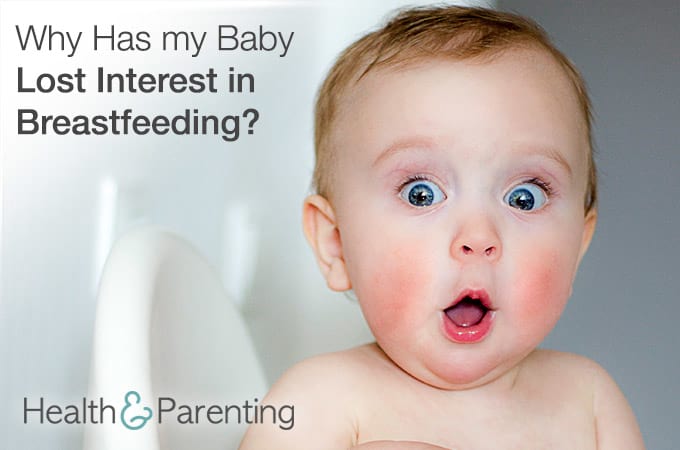Babies don’t usually self-wean until they are around 18 months old. There are, however, a number of things that could cause your baby to lose interest in breastfeeding temporarily before then. If you are hoping to wean your baby before 18 months, you could gently use one of these periods as a way of encouraging your baby to wean.
True self-weaning is a very gradual process, and it can take months for your baby to stop breastfeeding. He may slowly begin to reduce the number of feeds he has throughout the day until he is having just one or two. Self-weaning occurs when your baby gives up that feed of his own accord. If you want to initiate weaning sooner, you can gently encourage your baby to gradually reduce feeds over a few weeks or months.
Why has my baby lost interest in breastfeeding?
It is not uncommon for babies aged around nine or 10 months old to temporarily lose interest in breastfeeding. This could be because:
- your baby is eating more solids – as your baby’s reliance on solid food grows, he’ll need less breastmilk to fill up his tummy. Though your baby has been eating solid food for months now, it may have taken him a while to start getting most of his nutrients this way. You’ve probably noticed that your baby feeds less frequently and for shorter periods now that he’s enjoying three meals a day.
- bottles are faster – if you’ve recently introduced a bottle, your baby may have grown accustomed to the flow of milk from a bottle. When breastfeeding, your baby needs to suckle before milk is released. For a baby used to getting milk straight away from a bottle, this can be frustrating.
- your baby is going through a developmental stage – the first year of life is pretty hectic for babies. They are developing lots of new emotional, social and physical skills. You may have noticed that your baby goes through short periods where he doesn’t seem quite himself, only for him to impress you with a new skill a few days later. During these developmental phases, your baby may be fussy, distracted and grumpy, all of which can interfere with breastfeeding.
- your baby is teething – some babies find breastfeeding soothes their gums, but others would rather skip the breastfeeds when their gums are sore. If your baby is teething, this could be what’s making him resist feeds.
- your baby is unwell – if your baby has a blocked nose, he may struggle to breathe during breastfeeds. Try gently suctioning the snot from your baby’s nose before feeds. You could also try breastfeeding in a steamy bathroom to help clear his airways during the feed.
If you would like to continue breastfeeding, you’ll need to keep offering your baby feeds during the day. Using a sling or carrier for skin-to-skin may encourage your baby to feed. Be patient and try to follow your baby’s lead.
Written by Fiona (@Fiona_Peacock), mother, writer and lover of all things baby related.
This information is not intended to replace the advice of a trained medical doctor. Health & Parenting Ltd disclaims any liability for the decisions you make based on this information, which is provided to you on a general information basis only and not as a substitute for personalized medical advice. All contents copyright © Health & Parenting Ltd 2016. All rights reserved.











